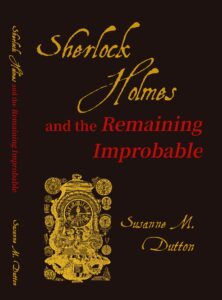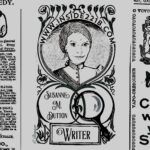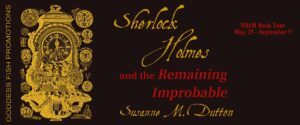 Today’s special guest is mystery author Susanne M. Dutton. We’re talking about her new mystery, Sherlock Holmes and the Remaining Improbable.
Today’s special guest is mystery author Susanne M. Dutton. We’re talking about her new mystery, Sherlock Holmes and the Remaining Improbable.
During her virtual book tour, Susanne will be awarding a $50 Amazon or Barnes and Noble (winner’s choice) gift card to a lucky randomly drawn winner. To be entered for a chance to win, use the form below. To increase your chances of winning, feel free to visit her other tour stops and enter there, too!
Bio:
Susanne Dutton is the one who hid during high school gym, produced an alternative newspaper and exchanged notes in Tolkien’s Elfish language with her few friends. While earning her B.A. in English, she drove a shabby Ford Falcon with a changing array of homemade bumper strips: Art for Art’s Sake, Forgive Us Our Trespasses, Free Bosie from the Scorn of History. Later, her interests in myth and depth psychology led to graduate and postgraduate degrees in counseling.
Nowadays, having outlived her mortgage and her professional counseling life, she aims herself at her desk most days; where she tangles with whatever story she can’t get out of her head. Those stories tend to seat readers within pinching distance of her characters, who, like most of us, slide at times from real life to fantasy and back. A man with Alzheimer’s sets out alone for his childhood home. A girl realizes she’s happier throwing away her meals than eating them. A woman burgles her neighbors in order to stay in the neighborhood.
Born in Des Moines, Iowa, Susanne grew up in the SF Bay Area, has two grown children, and lives with her husband in an old Philadelphia house, built of the stones dug from the ground where it sits.
Welcome, Susanne. please tell us a little bit about your newest release.
The game is not afoot. The Better-Every-Day world of 1895 is gone, even hard to recall as WWI ends. From his rural cottage, Holmes no longer provokes Scotland Yard’s envy or his landlady’s impatience, but neither is he content with the study of bees. August 1920 finds him filling out entry papers at a nearly defunct psychiatric clinic on the Normandy coast. England’s new Dangerous Drugs Act declares his cocaine use illegal and he aims to quit entirely. Confronted by a question as to his “treatment goal,” Holmes hesitates, aware that his real goal far exceeds the capacity of any clinic. His scribbled response, “no more solutions, but one true resolution,” seems more a vow than a goal to his psychiatrist, Pierre Joubert. The doctor is right. Like a tiny explosion unaccountably shifting a far-reaching landscape, the simple words churn desperate action and interlocking mystery into the lives of Holmes’ friends and enemies both.
Please tell us about your main character and who inspired him/her.
My main character was invented by Arthur Conan Doyle based on Joseph Bell, a professor at the Edinburgh medical school Conan Doyle attended. That’s only part of it because hundreds of writers and many actors have contributed to the Holmes mythology. It would be fair to say that my inspiration was a piece of the Holmes story that seems missing to me and that I haven’t seen anywhere else. So I wrote it.
Excerpt from Sherlock Holmes and the Remaining Improbable:
Joubert speaks to Holmes:
Joubert spoke eagerly. “You have managed a disguise?”
“Yes. Simple, but effective. I am half naked and barefoot. I have torn away one leg of my trousers entirely and, otherwise, kept my vest. The cinders work well to dirty my hands, arms, legs, and feet. A rag, held in place by a piece of the fishing net, serves as a kind of veil. Do not doubt it! Nakedness is one of the finest of disguises. Men see through a change of dress long before they see through a lack of it.”
I couldn’t help a burst of laughter, but when Joubert glared at me, I nodded my acquiescence. His attention reverted to Holmes.
“I hunch forward,” my colleague explained, “and affect an exaggerated limp, dragging my right leg . . . Moving to the edge of the crowd . . . I follow a man who has lost both legs from the knee down. He pushes himself along in a flat, small-wheeled cart, jeering as heartily as the rest . . . He wears a military jacket—split up the sides and faded, held to his chest with what might be a gentleman’s stocking. Across his thighs is draped a flag of the republic, doubtless torn from its place outside one of the big city houses . . . but I pass easily in his wake, for I am bizarre, but not so remarkable as he. The mob grows, and yet we two seem to be able to move through it, into the center. Everyone fears our filth, our stench—and the disease they presume. . . A boy with a drum joins the crowd. . . Then the same chant.
 Do you listen to music when you’re writing?
Do you listen to music when you’re writing?
I listen to the sounds on the street, like the garbage truck and the sanitation workers kidding each other. I hear the regional rail go by, squirrels scrambling over the tile roof, wind, and dogs barking.
Do you ever read your stories out loud?
Always. I favor sentences that sound good, and sound good next to one another, though mine don’t always measure up. It’s a goal. Stories are “composed,” just like music, but each phrase, sentence and paragraph is composed, too, in meaning, images and sounds. Also, it’s absolutely the best way to catch mistakes.
Have you ever had an imaginary friend?
Not in the sense that I had to leave extra space on the subway bench or save half my sandwich. I’ve had to come to grips with the fact that all of my friends have been imaginary, but only at first and only partly. After all, my best friend is someone I got to know slowly over time. If we are to stay friends I have to let go of some of what I initially imagined about that person. Then the imaginary parts change into the reality. That’s a good question for a friend. What did you imagine about me when we met?
Do you have any phobias?
For a long time I had just one phobia: very large crowds. Then I was served a salad at a pub I love and suffered for hours that night. I go back to the pub, no problem, but I hold all spinach responsible, forever.
Links:
Blog | Facebook | Publisher
Thanks for being here today!

